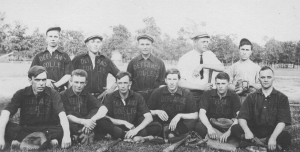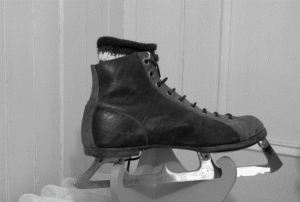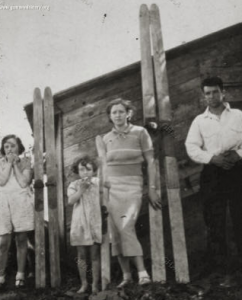Historical Sport Resources for Historical Fiction Writers
B.J. SEDLOCK

Memorial to James Ritchie d.1840, at Tibbermore Church near Perth, Scotland, with curling stone near the top. Credit: Courtesy of Bob Cowan, of Curling History Blog, http://curlinghistory.blogspot.com/
Does your novel need a description of what people wore when skiing in the early 20th century? Are you setting a scene at a Victorian racetrack and want to incorporate the name of a real horse from the era? Do you need to make sure your reference to a baseball uniform for a certain team is correct for your novel’s period?
Here are some websites that contain research material, viewable for free, on sporting history. Some of them would be good story idea generators as well, and all are fun to browse.
If your sport of interest isn’t here, it may be because I couldn’t find a website with much free content. I have tried to highlight websites which offer more than just a brief narrative history of the sport.
Football and soccer

An American football college player’s uniform in 1902, from an advertisement. Credit: Library of Congress reproduction number: LC-DIG-ppmsca-42592
Catalog number: 2002715836
American Football: The Pro Football Hall of Fame offers an extensive timeline of the sport, spanning 1869 to the present. Some images are included in the timeline pages. Sometimes the HOF’s website offers a special online exhibit featuring a particular collection, but I discovered that they are only available temporarily. I had been going to describe in this article an interesting exhibit featuring a noted player’s documents from the 1920s, but the exhibit has now been removed.
This fun interactive page gives you a virtual 360 degree tour of the history of the New York Giants in the team’s Tributes Room and the Legends Room. The screen will slowly rotate, giving you a chance to click on a particular item in a display case to get more information about it. Another section of their site has a slideshow on the helmet designs Giants team members wore in past decades.
Association Football/Soccer: The FIFA website allows you to trace the evolution of football laws, and also read a brief history of the sport.

Unknown British football/soccer team, 1921. Credit: Library of Congress
Reproduction number: LC-DIG-npcc-03291
Control number: npc2007003177
The Football Association (UK) website contains an extensive description of the association’s history in the UK.
The Australian Online Football Museum has a couple of interesting resources for historical novelists. The Timeline covers Australian football from 1850, with newspaper clippings and photos of important events. The Galleries contains images of member cards and badges, yearbooks and magazines, advertisements, etc.
![1914 Newtown [New South Wales] Football Club, showing uniforms. Credit: Courtesy NSW Australian Football History Society Inc. https://nswfootballhistory.com.au/](https://historicalnovelsociety.org/wp-content/uploads/2016/01/Picture3-300x211.png)
1914 Newtown [New South Wales] Football Club, showing uniforms. Credit: Courtesy NSW Australian Football History Society Inc.
https://nswfootballhistory.com.au/
Tennis
Wimbledon’s official site has a timeline in its “history” section that contains photos of famous players and brief articles about notable matches at Wimbledon from nearly every decade, starting in the 1870s.
Horseracing
![Saratoga, New York racetrack, 1913. Credit: Library of Congress LOT 11146-7 [P&P]; Reproduction number LC-USZ62-120652](https://historicalnovelsociety.org/wp-content/uploads/2016/01/Picture4-300x206.png)
Saratoga, New York racetrack, 1913. Credit: Library of Congress
LOT 11146-7 [P&P];
Reproduction number
LC-USZ62-120652
Allow time for this Victoria Racing Club’s page to load, as it is image-heavy; sometimes I get a “timed out” error message when trying to access it. But if you are persistent, it has some good material for an historical novelist. The site gives Flemington Racecourse history by decade back to the 1850s, with interesting images. Clicking on an image will bring up more information about it.
Learn about a woman who trained the winner of the 1938 Melbourne Cup, but because of the rules then in force, had to list her husband as the horse’s trainer. Read about Mark Twain’s impressions of his visit to the racecourse in 1895, or how Flemington was used for a review of 10,000 visiting American sailors in 1908.
Baseball

Defiance College baseball team, ca.1915, showing uniforms and gear. Credit: Defiance College Archives
Part of the National Baseball Hall of Fame’s history section of their website is an online exhibit of the history of uniforms of US major league baseball teams. You can search the database by team name and by years. Very useful if you are setting a novel in the baseball world and need to get the uniforms correct.
You can use the Library of Congress’ website to retrieve over 6,700 images of U.S. baseball history. Choose “Photos, prints and drawings” from the drop-down menu, then type “baseball” in the search box. You can refine the search by adding another term, such as “baseball and Pittsburgh”. Result: over 220 pictures. You can search for other sports as well. Library of Congress is a US government entity, so I asked a friend from outside the US try to access this site, and her computer was not blocked from using it.
Rowing
The Friends of Rowing History site concentrates on rowing in North America, though I noticed some UK material as well. It has a rowing history timeline, member-written essays on the sport, video clips, examples of memorabilia, and assorted historical images. This site has good material for story ideas. One essay talks about why rowing is different than other team sports, and another discusses the evolution of the rowing equipment over time. There is also a “true stories” page, with anecdotes about unusual races.
Bowling/ ten pins
BOWLING/TEN PINS
Max Gross calls bowling “the original American sport,” and on bowling images and clippings he includes snippets from period newspapers about the sport. There is not much “about us” information on this website, so it’s a little hard to judge its authoritativeness, but Gross appears to be a life-long bowler with an enthusiasm for preserving the sport’s history.
Ice hockey

1890’s hockey skate with a new puck stop design, to prevent the puck from passing through the goal tender’s skate blade. Credit:
Windsor Hockey Heritage Society
www.BirthplaceOfHockey.com
The Windsor Hockey Heritage Society is a not-for-profit which aims to maintain ice hockey’s heritage. The group is based in Windsor, Nova Scotia, which they claim as the birthplace of ice hockey. Novelists might be especially interested in these sections of the Windsor Hockey Heritage Society website: the Evolution tab gives you choices to click on to view images of early hockey gear, how the rules developed in the 1800s, and precursors of the game, such as hurling.
Curling
Curling historians David B. Smith and Bob Cowan offer curling blog posts which cover women curlers, Scotsmen who curled on the frozen Columbia River in the Pacific Northwest in 1847, and photos of a Scottish grave marker decorated with curling stones, commemorating a player who died in 1840.
Skiing

1937: Albert Parker pioneer family with homemade skis, Gustavus, Alaska. Credit: Alaska Lost Ski Areas Project,
http://www.alsap.org
The Guardian newspaper offers some eye-popping photographs of skiwear over the decades, from 1900-1973.
The University of Utah offers a site where you can click on “sample photos” in the right-hand column to see images from Utah’s skiing past. The University won’t allow re-use of the photos elsewhere without a fee, but you can view them for free.
This site aims to document “all ski areas…that once existed in Alaska.” A wealth of downhill, cross-country and ski jumping photos are included.
About the contributor: B.J. Sedlock is Metadata and Archives Librarian at Defiance College in Defiance, Ohio. She writes book reviews and articles for The Historical Novels Review, and has contributed to The Sondheim Review.






